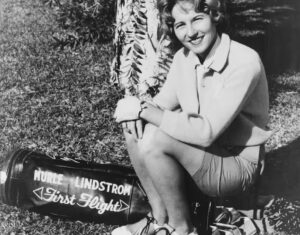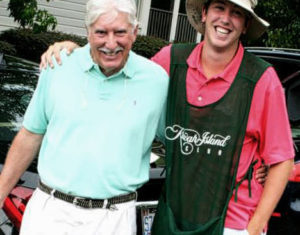Rise & Shine: Join Charlie Rymer on His Early A.M. Visit with Heritage Club Superintendent Jim Huntoon
PlayGolfMyrtleBeach.com’s Charlie Rymer paid a recent visit to Heritage Club, where Golf Course Superintendent Jim Huntoon took him behind-the-scenes to see what’s involved in keeping a top-shelf golf course looking good. Jim also offers some great tips for golfers on some easy ways they can do their part to help keep playing conditions at their peak.
Charlie Rymer:
All right, so it’s bright and early, and I’m here with the superintendent at Heritage Club, Jim Huntoon. Jim, let’s go ahead and knock this out. Every great superintendent has a really cool dog, and you’ve got a super-cool dog here in George! How long has George been with you?
Jim Huntoon:
Five years, he just turned five and he’s actually my second Labrador and he loves it out here. You’re right. It’s one of the perks of the job. I like to tell people he’s my therapy dog. When things go bad, he’s there for me. Sometimes when we do what we do, you need that.
Charlie Rymer:
Yeah. So let’s get into what you do. On a daily basis what time does this golf course need to be prepped and ready for play?
Jim Huntoon:
Anywhere between 7:24 and 8:04 a.m., depending on the time of year. So this time of year with the darkness, 8:04 is first tee time. We arrive about 6:30.
Charlie Rymer:
Then you got folks out mowing and raking and doing all sorts of stuff even before the sun gets up. I see in looking around here in your shop, I’m seeing a lot of headlights on this equipment. You guys put those to good use, I’m betting.
Jim Huntoon:
We do the LED lights, which have been a huge improvement in our industry. With the new-style lights it lights things up a lot better. But yeah, that’s definitely part of it.
Charlie Rymer:
Yeah. Going back to needing some therapy from George, over the years I’ve gotten to be buddies with a lot of superintendents, and I don’t think people understand you guys have a really tough job because on a daily basis when everything is smooth and perfect, you don’t exist. When you do exist is when you get some sort of issue, and that makes your occupation really challenging.
Jim Huntoon:
It does, but it’s very rewarding too. It goes both ways, we work hard and try to go through the process and give it its due diligence. If you do that, usually things will work out.
Charlie Rymer:
How many folks are on your staff here?
Jim Huntoon:
We’ve got about 16. Now about seven of those are part-timers. So with what we do here in Myrtle Beach, with a double tee you know it’s a little bit different than your traditional golf course. We have to get Holes 1 and 10 ready to go at 8:04 so we need some extra manpower. So a lot of guys, like today we’ll have four or five guys that will leave at 9:30 – they’ll do the morning job, mowing, come in and then they’re gone for the day.
Charlie Rymer:
Yeah, because it’s hard to mow grass when people are out there playing, right?
Jim Huntoon:
It is, that’s the thing. We got to try to get as much done as we possibly can ahead of the golfers. That’s our goal and that’s why we staff up like that.
Charlie Rymer:
I always thought weather’s the toughest challenge because golfers, if they got an 8 a.m. tee time they’re wanting to play at 8, and they might not understand a couple of hours ago it was raining, and so you guys rain or shine have to get this golf course prepped?
Jim Huntoon:
Yeah, this is just high-tech farming, Charlie, really. We just have to deal with the punches we’re thrown and you get over that, you learn to accept that early on if you’re going to be successful at this and you just take what comes and adjust.
Charlie Rymer:
One of the things that frustrates me when I go play golf, because everybody loves smooth greens, but everybody wants to do what their responsibility is, which is repair ball marks. If you’re lucky enough to make a ball mark, you’ve got to repair it. That’s got to be one of your pet peeves.
Jim Huntoon:
Yeah. My biggest thing is raking traps and it’s not so much whether you do it or don’t do it, a lot of times you’ll see golfers, they don’t give it much effort and they just go in there like this. If you spend an extra five seconds to smooth it out right, you’ve played on tour, you know how a bunker is supposed to be raked after you’re done. That’s really my biggest pet peeve. Not filling the divots and the ball marks doesn’t bother me as much as that.
Charlie Rymer:
The bad thing about it, too, is somebody doesn’t do a good rake job and the next person gets in there, the person who was supposed to rake it doesn’t get blamed, you do.
Jim Huntoon:
Exactly. Sometimes you’re better off just leaving it the way it is then than raking it poorly, I guess, is my take on that.
Charlie Rymer:
You mentioned filling divots. Every place you play golf now pretty much has the sand, the little containers with the sand in it. You mentioned that that’s not a big deal for you, but I see people all the time the after three holes, they don’t have any sand left in that container, because every time they make a divot, I mean they have filled that sucker up right there. That can’t be good for the golf course.
Jim Huntoon:
If they know how to do it, if you get the right amount of sand in the divot, it’s perfect. If you lump it up where it’s a little bit high, the mowers, the fairway mowers, the reels, that sand gets in them and then it’ll dull out the reels and that creates more work for our mechanic and everything and it affects the quality of cut. There are a lot of golfers that love to fill their divot and three or four more. I would say, of all the things in golf etiquette from my experience of 20 years doing this, is golfers are best at filling divots. I would say raking bunkers and filling ball marks would probably be second and third.
Charlie Rymer:
When you say the perfect sand filled … what does that mean to you? What does that look like?
Jim Huntoon:
It looks like, depending on the depth of the divot, you want to be about a quarter inch below the turf line, so that way when the mowers go through it, they’re not going to get it. That’s enough sand to let the Bermuda grass creep over. That’s the quickest healing as well.
Charlie Rymer:
A lot of folks think that there’s some sort of magic mix in there. Typically what do you have in your sand fill?
Jim Huntoon:
Straight sand here in Myrtle Beach. That’s what most everybody uses. The Bermuda grass will fill in. Now after we’re overseeded, we’ll add seed in there, but other than that, that’s all we do here. Some people will use the green sand, some just use yellow or white, we use whatever we have stockpiled at the time. Up north, different places, there are other things they’ll add in there, peat or other organic type amendments that will help the seed or the grass creep over or the seed to germinate. So it’s varied really.
Charlie Rymer:
What about replacing divots? A lot of times I see people trying to put pieces of a little divot back in and I’m looking, “that ain’t going to work.” What’s your thought process on replacing divots?
Jim Huntoon:
On Bermuda grass you really don’t replace, I mean obviously as you know on tour what people see on TV, the caddies always throw the divot back and replace it. But I think that’s more of a courtesy to the other golfers to not have their ball go directly into an old divot. You can talk about that more than me, but around here, no, what happens is if you put it back the next day or two, we’re going to come out and mow the fairways. Then most everybody in Myrtle Beach will send some kind of blower out behind the fairways to blow the clippings where those divots just get blown off with all the clippings.
Charlie Rymer:
So you’re wasting your time when you’re trying basically to replace divots.
Jim Huntoon:
Right.
Charlie Rymer:
Well, Jim, I appreciate your time.
Jim Huntoon:
Absolutely.
Charlie Rymer:
I know you guys get up early to make our golf experience as good as it can be, and for myself and all the other golfers out there, we appreciate what you guys do every day.
Jim Huntoon:
Thank you, Charlie. It’s our pleasure to do it. We love every minute of it.
Charlie Rymer:
And George, don’t stress out, okay?



